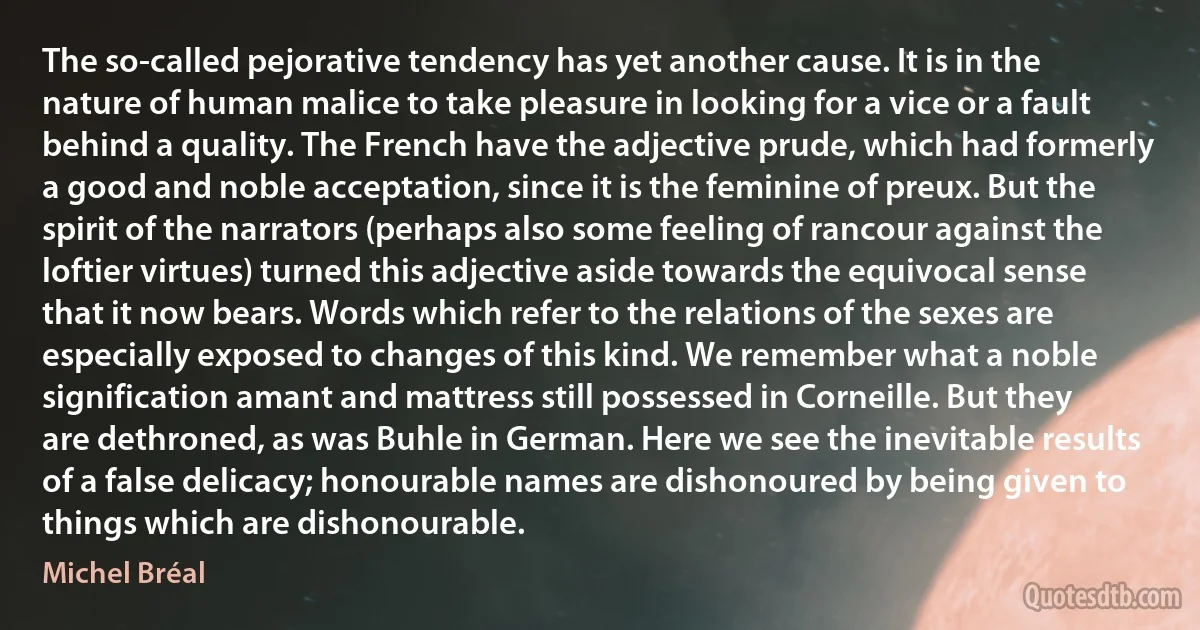
The so-called pejorative tendency has yet another cause. It is in the nature of human malice to take pleasure in looking for a vice or a fault behind a quality. The French have the adjective prude, which had formerly a good and noble acceptation, since it is the feminine of preux. But the spirit of the narrators (perhaps also some feeling of rancour against the loftier virtues) turned this adjective aside towards the equivocal sense that it now bears. Words which refer to the relations of the sexes are especially exposed to changes of this kind. We remember what a noble signification amant and mattress still possessed in Corneille. But they are dethroned, as was Buhle in German. Here we see the inevitable results of a false delicacy; honourable names are dishonoured by being given to things which are dishonourable.
Michel BréalRelated topics
acceptation adjective aside behind cause equivocal false fault french given good human kind looking nature noble now pejorative perhaps pleasure prude quality see sense signification spirit take tendency vice yet relations words things rancour namesRelated quotes
The Negro voter ... had, then, but one clear economic ideal and that was his demand for land, his demand that the great plantations be subdivided and given to him as his right. This was a perfectly fair and natural demand and ought to have been an integral part of Emancipation. To emancipate four million laborers whose labor had been owned, and separate them from the land upon which they had worked for nearly two and a half centuries, was an operation such as no modern country had for a moment attempted or contemplated. The German and English and French serf, the Italian and Russian serf, were, on emancipation, given definite rights in the land. Only the American Negro slave was emancipated without such rights and in the end this spelled for him the continuation of slavery.

W. E. B. Du Bois
I exhibited three paintings at the Salon d'Automne exhibition [Paris], which is the most interesting exhibition I have seen until now. Much more interesting than the Secession [in München]. My paintings [two words cancelled] were noticed and praised by the art critics. I think I will be very famous here in a few years time. Reading my name in the newspapers and seeing people notice my paintings and write about them has given me new and strange joy. – Paris is a beautiful city. Why do you remain in the monotony of Munich's heavy atmosphere? Here one can find everything one desires. Everything is refined and has spirit and everyday one learns something new.. The French are more intelligent than I thought. They laugh a lot, but they understand better than the Germans what is refined, strange and outside the ordinary.

Giorgio de Chirico
We have never cherished illusions about our enemies, we have not embraced and kissed them, we have not flattered them and we have not caressed them, we have never bowed to them. Our Party and Government have always maintained a firm, principled, Marxist-Leninist stand towards the enemies of peace and socialism; they have sharply and constantly exposed the imperialists, whether U.S. or British, French or Italian, and their policy of war and aggression; they have been irreconcilable with and have energetically and unreservedly supported the just cause of the peoples who have risen in struggle against imperialism. They have rendered all their support to the fraternal Algerian, Cuban, Congolese, Laotian and other peoples in their sacred struggle against imperialism, resolutely condemning all the aggressive attempts of imperialism.

Enver Hoxha
In looking at this wreck of Governments in all European countries, there is one consideration that suggests itself, sadly elucidative of our modern epoch. These Governments, we may be well assured, have gone to anarchy for this one reason inclusive of every other whatsoever, That they were not wise enough; that the spiritual talent embarked in them, the virtue, heroism, intellect, or by whatever other synonyms we designate it, was not adequate,-probably had long been inadequate, and so in its dim helplessness had suffered, or perhaps invited falsity to introduce itself; had suffered injustices, and solecisms, and contradictions of the Divine Fact, to accumulate in more than tolerable measure; whereupon said Governments were overset, and declared before all creatures to be too false.

Thomas Carlyle
The darkness crumbles away.
It is the same old druid Time as ever,
Only a live thing leaps my hand,
A queer sardonic rat,
As I pull the parapet's poppy
To stick behind my ear.
Droll rat, they would shoot you if they knew
Your cosmopolitan sympathies.
Now you have touched this English hand
You will do the same to a German
Soon, no doubt, if it be your pleasure
To cross the sleeping green between.
It seems you inwardly grin as you pass
Strong eyes, fine limbs, haughty athletes,
Less chanced than you for life,
Bonds to the whims of murder,
Sprawled in the bowels of the earth,
The torn fields of France.
What do you see in our eyes
At the shrieking iron and flame
Hurled through still heavens?
What quaver--what heart aghast?
Poppies whose roots are in man's veins
Drop, and are ever dropping;
But mine in my ear is safe--
Just a little white with the dust.

Isaac Rosenberg
